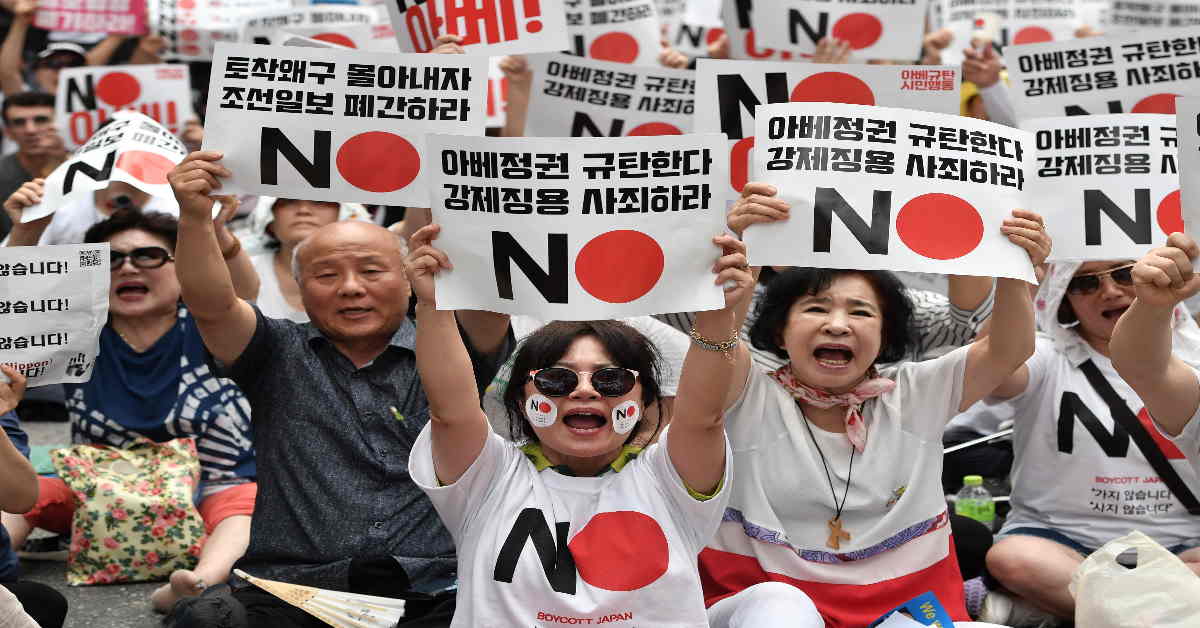Japan and South Korea have never been easy partners. Although both have long been well-consolidated democracies, historical and territorial disputes have consistently marred bilateral relations. But today, their relationship may be at its lowest point since diplomatic ties were established in 1965.
The situation began to deteriorate in July, when Japan’s trade ministry introduced new licensing requirements that impede exports of three chemicals that South Korea needs to manufacture high-tech products like semiconductors and display panels. Japanese officials claimed that the move was necessary to prevent sensitive materials from being shipped illegally to North Korea for military use. South Korea called the justification groundless, and consumers launched a boycott of Japanese goods, from beer to clothing.
In South Korea’s view, Japan is trying to punish it for a 2018 Supreme Court decision ordering Japan’s Mitsubishi Heavy Industries to compensate South Koreans for forced labour during Japan’s occupation of the Korean Peninsula during the first half of the 20th century. Japan contends that the 1965 treaty establishing diplomatic relations – which included US$500 million in grants and loans to South Korea – resolved all questions related to compensation, while South Korea argues that the treaty does not cover individual claims.
In any case, Japan did not stop at semiconductors. In August, it removed South Korea from its “white list” of countries that receive preferential trade treatment. Japanese exporters now require government approval each time they export a shipment of “strategic items” – including 1,115 types of parts and materials – to South Korea.
South Korea then filed a complaint with the World Trade Organization (WTO) about Japan’s export controls and removed Japan from its own white list of trusted trade partners. It also announced that it would not renew the General Security of Military Information Agreement (GSOMIA), a bilateral arrangement that facilitates exchanges of sensitive intelligence, including about North Korea’s nuclear and missile programs.
The economic consequences of the spat are already becoming apparent. Rising tensions, together with a broader economic slowdown, caused South Korean exports to Japan to fall by 6.2 percent year on year in August. Over the same period, Japanese car sales in South Korea plummeted by 57 percent, owing largely to consumer boycotts, and the number of Korean visitors to Japan dropped by half.
And the dispute may be set to escalate. In particular, if assets seized from Mitsubishi Heavy Industries under the 2018 court order are liquidated next year, Japan will most likely implement tough new retaliatory measures. This would plunge Japan-South Korea relations into turmoil, with far-reaching implications for both sides – Japan is South Korea’s fifth-largest export market, and South Korea is Japan’s third-largest – and for the entire global economy.
Japan and South Korea are the world’s fourth- and fifth-largest exporters, respectively, and major players in global tech supply chains. At a time of rising protectionism worldwide – exemplified by the protracted United States (US)-China trade war – and heightened geopolitical risks, a Japan-South Korea trade conflict is the last thing the global economy needs.
Japan and South Korea are two of the largest beneficiaries of the post-World War II multilateral trading system, and neither can escape criticism for damaging it. As Group of Twenty (G20) leaders emphasized in Osaka in June, trade should be “free, fair, and non-discriminatory.” But outside criticism is unlikely to carry as much weight as domestic public opinion, which in both countries seems to oppose concessions.
In fact, by stoking nationalist sentiment and appealing to deep-rooted public mistrust of the other, South Korean President Moon Jae-in and Japanese Prime Minister Shinzo Abe have marshalled considerable popular support for a tough stance. According to the latest survey by Nikkei-TV Tokyo, 67 percent of Japanese support the government’s export controls. In South Korea, recent polls indicate that a majority of citizens are participating in the boycott, and 48 percent support exiting the GSOMIA.
The best chance of convincing Abe and Moon to compromise lies with intervention by the US. But President Donald Trump’s administration has so far taken a largely hands-off approach to the dispute, which it seems to have assessed solely in terms of US economic interests. This misses the tremendous strategic importance of ensuring continued cooperation between two major Asian allies, both for managing North Korea’s nuclear ambitions and for coping with growing Chinese influence.
In fact, China is already seizing the opportunity created by the Japan-South Korea rift to expand its influence, including by playing the role of mediator. At a trilateral meeting of foreign ministers in late August, China encouraged Japan and South Korea to engage in continuous dialogue to resolve their differences.
After South Korea announced that it would not renew the GSOMIA, high-ranking US officials expressed “strong concern” and “disappointment,” and called on South Korea “to recommit” to the pact, which is a critical component of America’s security architecture in Asia. It’s a start, but what is really needed is for the Trump administration to bring Japan and South Korea to the negotiating table.
In lieu of such leadership, Japan and South Korea must recognise the danger their dispute poses and exercise self-restraint. With or without the US, they need to find a way to break the deadlock before it spirals out of control.
Lee Jong-Wha is Professor of Economics and Director of the Asiatic Research Institute at Korea University. His most recent book, co-authored with Harvard’s Robert J. Barro, is Education Matters: Global Schooling Gains from the 19th to the 21st Century.
